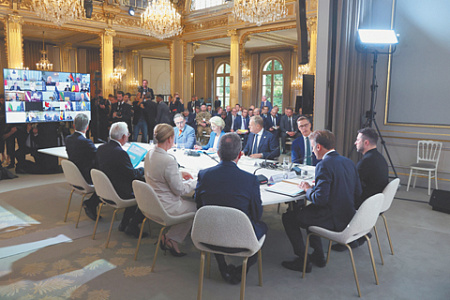
Leaders from a 26-nation coalition have outlined a plan for a future peacekeeping mission in Ukraine following a high-level summit in Paris. French President Emmanuel Macron announced that the alliance is prepared to send troops or provide financial support, but stressed that any deployment is contingent on a complete cessation of hostilities and a future peace agreement. The announcement came after a video conference with former U.S. President Donald Trump, who is reportedly pushing European allies to sever all remaining Russian oil imports and increase economic pressure on China.
The specifics of the deployment remain highly uncertain. Macron did not clarify whether the mission would require a temporary truce or a comprehensive peace agreement, a critical distinction given Moscow’s stance. The Kremlin has consistently rejected a simple ceasefire, insisting on a final settlement that addresses what it calls the root causes of the conflict. This position has recently found apparent support from Trump, casting further doubt on when, or if, the coalition’s troops might actually be deployed on Ukrainian soil.
Despite his previous assertions that U.S. troops would not be sent to Ukraine, Trump’s involvement remains pivotal. Macron revealed that the United States is expected to contribute to the coalition, with its role to be defined “in the coming weeks.” Following the expiry of a September 5 deadline he had set for Moscow and Kyiv to reconcile, Trump has opted to delay new sanctions against Russia, instead threatening punitive measures only “if Russia continues to refuse substantive peace negotiations.”
The Paris summit, attended by leaders including Ukrainian President Volodymyr Zelenskyy and the heads of the European Commission and Council, was held against a backdrop of growing concern in the West over a deepening Russia-China alliance. The meeting also highlighted subtle fractures among allies. Finnish President Alexander Stubb, for instance, recently criticized Trump’s tariff policies, arguing they inadvertently push neutral nations closer to Beijing.
Adding to the summit’s intrigue was the unannounced and brief appearance of Steve Witkoff, a Trump special representative known for handling sensitive contacts with the Kremlin. Witkoff attended the talks for about 40 minutes before departing without addressing the media, leaving his role in the discussions unclear. The gathering of key European figures also saw the last-minute absence of Spanish Prime Minister Pedro Sánchez, reportedly due to a technical issue with his aircraft.
The ambitious plan has been met with caution, even from within the pro-Ukraine camp. Poland’s defense minister, for example, has publicly ruled out sending Polish soldiers, reflecting a pragmatic approach of balancing support for Kyiv with risk aversion, a stance influenced by domestic public opinion. Meanwhile, Russian analysts remain skeptical, questioning Europe’s readiness to risk a direct military confrontation by crossing what Moscow has previously defined as a critical red line.
